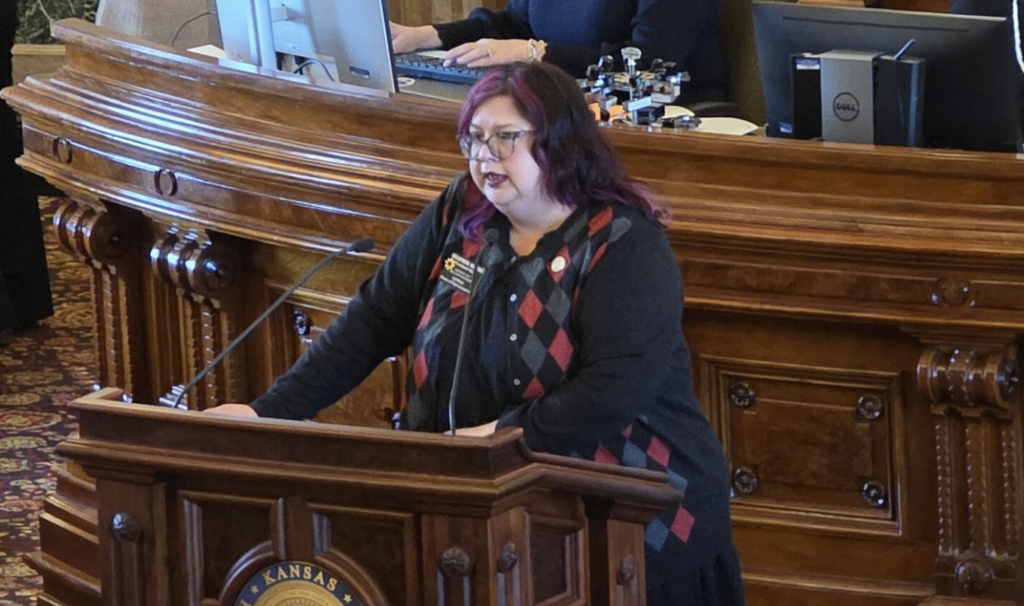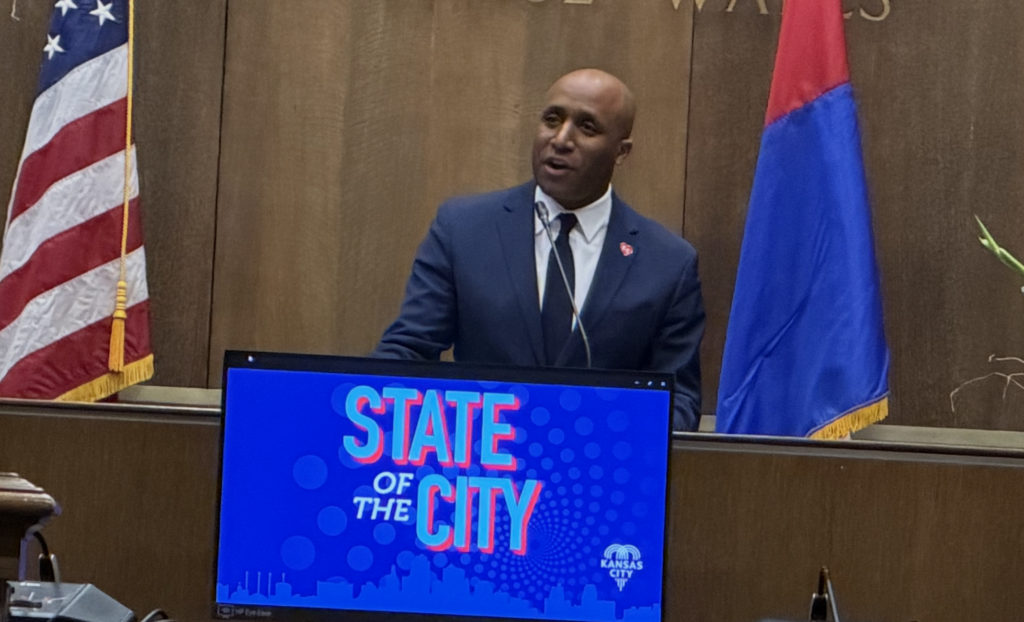Missouri Supreme Court reviews voter ID mandate, ban on paid registration efforts
Republicans have been trying since 2006 to enact the photo ID requirement in Missouri. Prior to the 2022 law, every attempt had been rebuffed by the courts.

Denise Lieberman of the Missouri Voter Protection Coalition, center, speaks Wednesday about the Supreme Court hearings on laws requiring a government-issued voter ID and barring paid voter registration solicitors (Rudi Keller/Missouri Independent)
The Missouri Supreme Court must decide if voters need government-issued ID cards and whether people trying to register new voters can be paid.
The judges on Wednesday heard a pair of cases arising from a 2022 law that also established two weeks of early voting before each election. If the high court throws out the voter ID portion of the law, it would trigger a provision that also scuttles the early voting period.
The Missouri NAACP and the League of Women Voters filed both lawsuits and got a split result at the trial court level in Cole County. Circuit Judge Jon Beetem ruled the photo ID requirements were “everyday burdens” that did not violate voter rights but that the limitations on individuals and organizations running voter registration campaigns “chill speech and advocacy related to voting and decrease participation in elections.”
Together, the outcome of the two cases will determine whether Republicans have finally succeeded in goals they have sought for years — stricter limits on acceptable voting identification and higher obstacles for organizations engaged in voter registration campaigns.
Opponents of the voter ID requirements aren’t arguing that there should be no requirement for identification, Jason Orr of the ACLU of Missouri told the court Wednesday. It is the limited list of acceptable identification that violates voter rights, he said.
To vote under the 2022 law, a person must present a Missouri drivers license, non-driver identification or another identification card issued by Missouri or the federal government with a photo, birthdate and expiration date.
“This type of state photo ID requirement does not pass muster under the Missouri Constitution,” Orr said.
Beetem’s ruling misses the mark, Orr said, because people with mobility issues who cannot obtain documents such as a birth certificate or who have misspellings on their documents have far more trouble than others getting identification issued.
The burdens “certainly are not shared by majority citizens, but they are real, and they frustrate the ability of some Missourians to exercise this right,” Orr said.
Missouri Republicans have been trying since 2006 to enact the photo ID requirement. Prior to the 2022 law, every attempt had been rebuffed by the courts. Before the law took effect, acceptable identification included a school ID, a voter card issued by their county clerk or a utility bill in their name at their voting address.
The photo ID requirement protects the integrity of elections and there is little evidence it has prevented Missourians from voting, said Lou Capozzi, state solicitor general.
People without ID can cast provisional ballots that will be counted if their signature matches the one on file, he said. In 2022, he said, only 116 ballots were not counted.
In his ruling, Beetem decided that the individual plaintiffs named in the lawsuit had not shown sufficient injury to sue and neither had the NAACP or the league as organizations. Capozzi noted that in his arguments.
“They could present the court with a single person unable to vote under the law,” he said.
At a news conference after the hearing, Attorney General Catherine Hanaway said 116 “is not a lot of votes” and it shows the law is working as intended.
“The goal is that anybody who is trying to vote who shouldn’t be voting because they’re an illegal immigrant, because they don’t live in Missouri, because they’re trying to vote more than once, doesn’t get that opportunity,” Hanaway said.
Denise Lieberman of the Missouri Voter Protection Coalition said she sees 116 votes not being counted as a violation of all Missourians’ rights. The inclusion of both the voter ID requirements and limitations on signing up new voters in the same bill shows the intent to make it harder, not easier, to vote, she said at a news conference.
“The burdens to voters of a strict photo ID requirement to vote, the burdens on political speech of the voter registration and absentee ballot solicitations, are not academic,” Lieberman said. “They are not simply a matter of constitutional debate. These affect real voters here in the state of Missouri.”
The voter registration provisions bar paid voter registration solicitors, require anyone working to register voters to be a registered Missouri voter at least 18 years old and to file paperwork with the secretary of state’s office. The law also banned the practice of paying people to collect absentee ballots on behalf of homebound voters.
Arguing to overturn Beetem’s ruling, Deputy Solicitor General Michael Patton said the lower court ruling accepted too broad a definition of soliciting. Organizations can engage in voter registration drives that direct people to sign up through official government websites, he said, but cannot have individuals fill out cards that are turned in by the group.
Judge Paul Wilson was skeptical. He asked where else the limited definition would be acceptable.
“Should we apply that in a soliciting sex case, saying that if it does not result in a completed transaction, it isn’t soliciting?” Wilson asked.
Patton said the intent to receive sexual activity is what qualifies the act as soliciting.
And if a person working for a voter registration drive does not intend to personally collect registration forms, he said, it would not violate the law.
“Unless there is an exchange of a completed application, we do not believe that is soliciting,” Patton said.
The law includes criminal penalties for people who violate the restrictions on registering new voters. That has a chilling impact on free speech because it is open to interpretation, Kristen Mulvey of the Missouri ACLU told the judges.
The state has been unable to provide a consistent definition, Mulvey said. That will lead local law enforcement to make its own interpretations, she added.
“It is not the secretary of state,” Mulvey said, “but each of the 115 prosecutors who are also defendants in this case, who are tasked with enforcing the criminal provisions.”
Missouri Independent is part of States Newsroom, a nonprofit news network supported by grants and a coalition of donors as a 501c(3) public charity. Missouri Independent maintains editorial independence. Contact Editor Jason Hancock for questions: info@missouriindependent.com.




